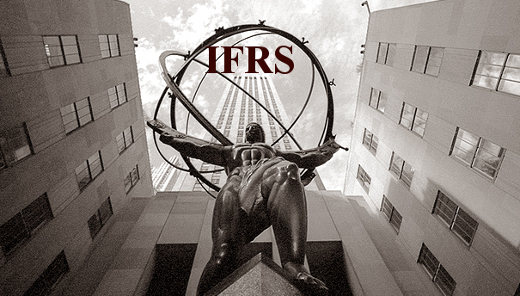Posts Tagged ‘Accounting’

The routines of adoption have been the conservative and the formats to be prescribed in detail in valuation of assets. The differences under IFRS and GAAP have been seen in the example of Telofonica Company, as its balance sheet showed two different figures in valuation of assets. The financial statement prepared under IFRS showed higher result of assets compared to GAAP mainly because the IFRS lets the companies revalue their assets. Moreover, the strict control of compliance with the Directives (Fourth and Seventh) when using IFRS has also been mentioned as one of the main factors to be taken into consideration. Furthermore, according to one of the respondents, the requirement under the Fourth Directive that annual accounts should present a true and fair view of a company’s assets, liabilities, financial position has also been mentioned as a key factor while adopting IFRS. The findings regarding the adoption of IFRS by EU listed companies are that majority of EU listed companies have adopted the IFRS for more than just for consolidation purposes and their answers have been categorised below according to their level of importance: The process of adoption is complex, burdensome and at the sae time expensive Companies do not think that they can lower the cost of capital even if they apply IFRS Key challenges as mentioned during the interview are lack of guidance while converting and implementing IFRS, lack of uniform interpretation even though IFRS tends to be more flexible and informative And majority of EU companies would not adopt IFRS if it was not required by EU regulation. Moreover, conversion to IFRS will also improve the shareholder orientation in countries such as France and Germany as they used to emphasize on tax regulations and stakeholder orientation, therefore, these country’s investors benefit greatly due to them being as…

1. Advantages of IFRS compared to GAAP reporting standards 1.1 Focus on investors One of the significant advantages of IFRS compared to GAAP is its focus on investors in the following ways: The first factor is that IFRS promise more accurate, timely and comprehensive financial statement information that is relevant to the national standards. And the information provided by financial statements prepared under IFRS tends to be more understandable for investors as they can understand the financial statement without the necessity of other sources which makes investors more informed This also helps new or small investors by making the reporting standards simpler and better quality as it puts small and new investors in the same position with other professional investors as it was impossible under the previous reporting standards. This also helps to reduce the risk for new or small investors while trading as professional investors can not take advantage due to the simple to understand nature of financial statements. Due to harmonization and standardization of reporting standards under IFRS, the investors do not need to pay for processing and adjusting the financial statements to be able to understand them, thus eliminating the fees of analysts. Therefore, IFRS reduces the cost for investors. Reducing international differences in reporting standards by applying IFRS, in a sense removes a cross border takeovers and acquisitions by investors. Based on information mentioned above, it can be assumed that because higher information quality reduces both the risk to investors from buying and owning shares and the risk to less informed investors due to wrong selection due to lack of understanding, it should lead to reduction in firms cost of equity capital. This on one hand should increase the share prices, and on the other should make new investments by firms more attractive. Moreover, the following…

The main differences between GAAP and IFRS, are mainly that IFRS has wider rules and less specific guidance which gives more room to interpretation of the financial statements. Because the IFRS incorporates the value of judgement by the accountant, it tends to be less detailed, more flexible and more informative. The differences between GAAP and IFRS have been analysed in terms of their financial statement presentation, technicalities, and their importance for users of financial statements. 1. The statement of financial position The changes in the layout of the statement of financial position as it is more concise and less detailed compared to the layout of the statement of the financial statement prepared under GAAP. An example for this can be the layout of the financial statements. US GAAP requires its public companies to follow Regulation S-X where it specifically shows the detailed list of elements to be included in the financial statements. However, IFRS also requires what to include in the financial statements, but it is far less detailed than the US GAAP. Moreover, the guidance on offsetting of assets and liabilities can be indicated as another difference, thus, US GAAP gives limited guidance on offsetting of assets and liabilities whereas IFRS gives specific guidance. And another difference is the exclusion of long term debt being refinanced under GAAP whereas under IFRS, the exclusion of long term debt from current liabilities. And the similarities is the same components of financial statements under both IFRS and GAAP as both financial standards require to have balance sheet, income statement, cash flow and the accompanying notes to the financial statements. 2. Financial periods required Firstly, US GAAP requires the last two years of balance sheet to be presented, and other statements are required to be for the last 3 years. However, IFRS…

“The decision of the Commission of the European Union (EU) to oblige listed European companies…to establish their consolidated financial statements according to IFRS (IAS) represents a preliminary peak in the internationalisation process of financial accounting in Europe” (Haller and Kepler, 2002). The need for Harmonization: The activities of companies extend beyond national frontiers and shareholders and other stakeholders need protection throughout the EU. And in order to achieve this and to encourage the movement of capital, it is necessary to create a flow of reliable homogeneous financial information about companies from all parts of the EU. And they further argue that since companies in different EU countries exist in the same form and are in competition with each other, they should be subject to the same laws and taxation. Obstacles for harmonization in the EU: The obstacles for harmonization are the fundamental differences between the contexts and purposes of the various national accounting systems in the EU. And the main differences are: Differences between creditor/secrecy in the traditional Franco-German systems and investor/disclosure in the Anglo-Dutch systems Differences between law/tax-based rules and private sector standards These difference shave contributed towards the great variations in the size and strength of the accountancy profession. Here are some social-cultural related problems that IFRS can encounter by its implementation in various countries: One of the most crucial issues is the lack of strong professional bodies in some countries to promote the harmonization. The bodies such as IASC (International Accounting Standards Committee). Due to lack of these professional bodies, there will be less guidance to follow and support available. Another point is the degree of professional education and training systems for accounting. Education and training systems in developed and western countries are more professional than in developing countries. Therefore, the accountants in these countries will be sooner…
